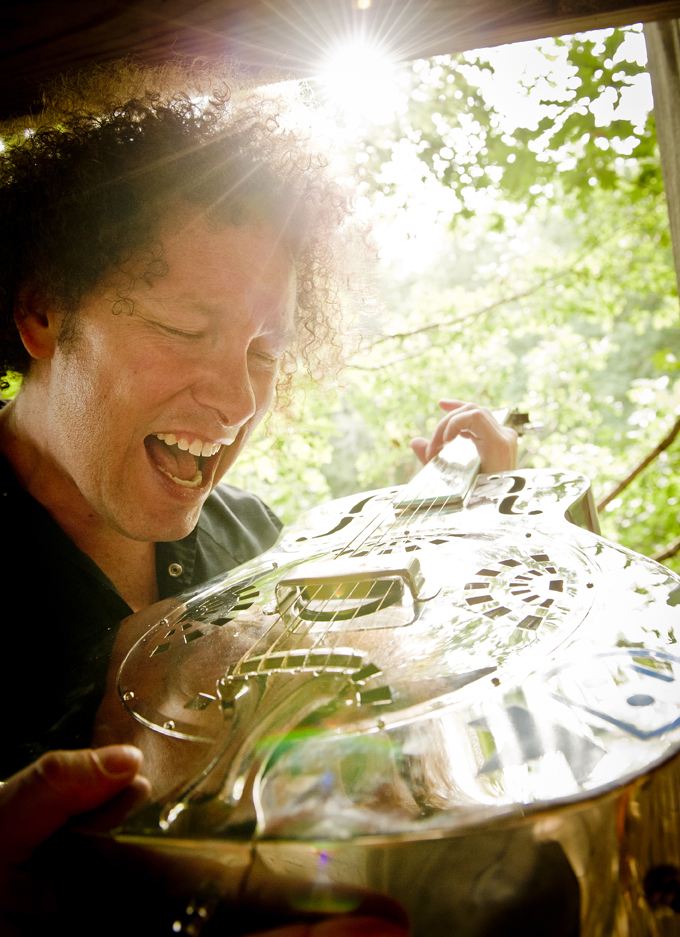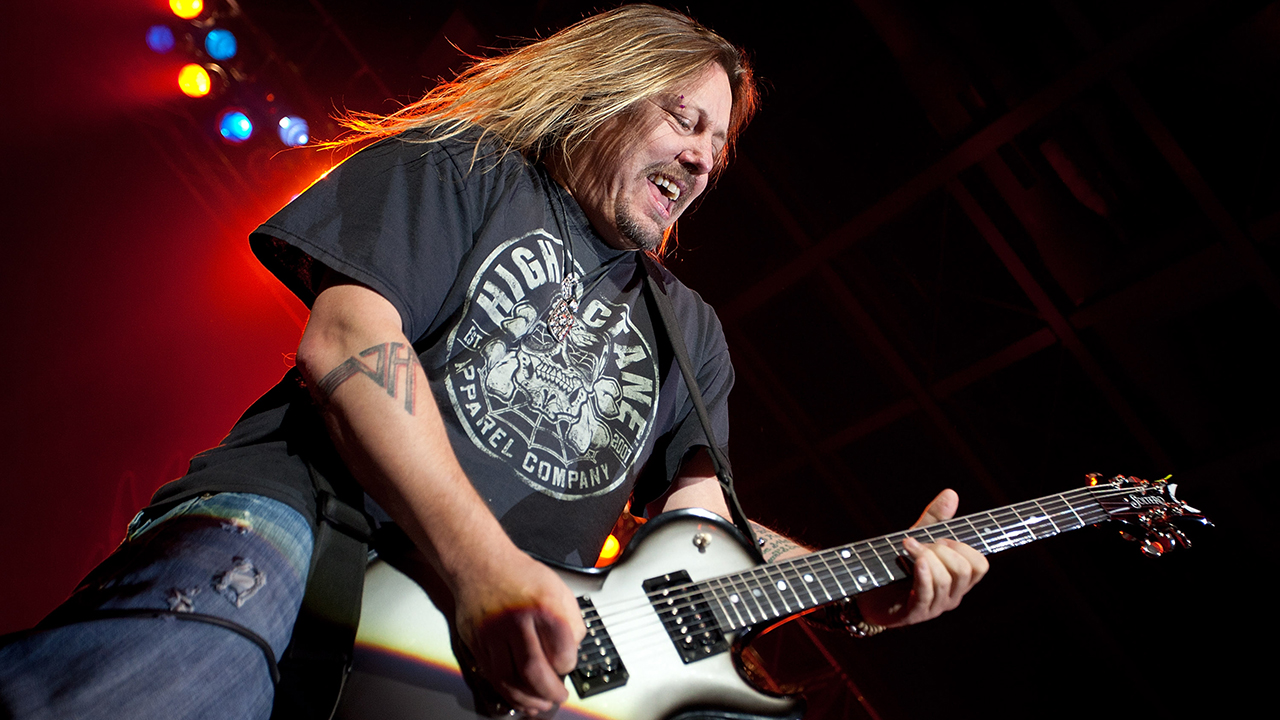Interview: Ned Evett Discusses His Fretless, Glass-Fingerboard Guitars and New Album, 'Treehouse'
All the latest guitar news, interviews, lessons, reviews, deals and more, direct to your inbox!
You are now subscribed
Your newsletter sign-up was successful

In 1990, guitarist Ned Evett smashed his Strat onstage.
When he noticed the neck was unbroken, he simply removed the frets and developed a style he'd eventually become known for -- even developing his own fretless, mirrored-glass-necked guitars along the way. His own website refers to him as "The Glass Guitarist," and Joe Satriani has called him "a monster player."
Now, after releasing Treehouse, his sixth solo album, in January, Evett is finally getting some long-overdue recognition as a singer and songwriter.
"Being well known for something innovative is great, but sometimes it gets in the way of what’s really important, which is the music I’m writing," Evett said. "I love what I’m doing right now as an artist writing songs -- and, of course, my guitar is integral to my songwriting process.
"Writing music that is an honest reflection of your life experience is hard work, and recording it right and then performing it with sustained conviction on the road is even harder, and I live for that struggle and opportunity to share my music with the world."
We recently spoke to Evett about his guitars and about Treehouse, which was produced by Adrian Belew. The album features songs drawn from his own experiences and observations. They run the gamut from tender pieces to hard-rocking blues -- and everything in between.
GUITAR WORLD: What's up with this glass guitar of yours? How much of it is made of glass? Who made it? Where’d you get it -- and why?
All the latest guitar news, interviews, lessons, reviews, deals and more, direct to your inbox!
The fingerboard is glass. I developed the glass fingerboards in 1996 with my friends Cherian Jubilee and Rob Renick. I was living in San Francisco and had been wearing out ebony fingerboards playing loads of gigs. I didn't have the money for a metal fingerboard, so I thought of the glass option, which Rob knew how to cut. Glass is cheap, easy for an expert glass guy to shape, and sounds incredible; on fretless guitar, whatever the fingerboard is comprised of directly affects the tone.
In 1999, I launched fretlessguitar.com [now redirected to nedevett.com] and started selling Fernandes guitars with glass and lined-wood fingerboards. This led to me releasing Fretless Guitar Masters in 2001, the world's first fretless guitarist compilation, co-produced with Franck Vigroux.
What other gear did you use on Treehouse?
Ampwise, we used a Buddah Superdrive 18 and Adrian's Matchless DC-30 for the solos: we cut the solos in one six-hour session. For the leads I used my Peavey Omniac with an aluminum fretless fingerboard, and my glass fingerboard Fernandes Native Pro with a sustainer pickup.
For the rhythm electric parts, the magic bullet was my Fretless Danelectro ‘59 reissue (with a radiused glass fingerboard) into a Peavey Delta Blues 2x10 combo. I first cut a radius glass fingerboard for John Frusciante in 2007, courtesy of a chance meeting with his guitar tech, Dave Lee.
What led you to the world of fretless guitars in the first place? Who were your influences on that route?
Adrian Belew and Jaco Pastorius, in that order of discovery. I witnessed Adrian playing the fretless with King Crimson on their Live in Japan concert video on MTV Concerts in 1984 and wondered what it would be like to play it on EVERY song. Jaco came into the picture for me later, after he passed away, which was such a tragedy. I should note, there were no "fretless guitarists" per se in those days to model from, so playing the fretless guitar always felt like new ground.
Who are your influences in a more general sense?
I grew up on Bach, baseball, The Beatles and the blues. I was born in Nashville, Tennessee, and raised in Boise, Idaho, both towns full of amazing pickers. In Idaho I learned to play traditional folk tunes alongside Bach Lute Suites and push-pull contrary motion bends from the local country players. Growing up I focused on finding my own voice on the guitar and was never been satisfied with being a clone.
Who inspires you today -- and/or what do you listen to?
I’m listening to Muddy Waters, Robert Johnson and Ravi Shankar. For true inspiration, there is spending time with my 11-year-old son, who co-wrote "Sayonara Serenade" off of Treehouse with me. I’m also addicted to documentaries streamed on demand and recently enjoyed Bela Fleck’s Throw Down Your Heart documentary, which was filmed in Africa.
How important are effects to you, and what's on your pedal board these days -- if anything?
Effects aren’t that crucial to my sound; the fretless glass fingerboards and my fingerstyle electric playing define my style more sonically. However, I have a Fulltone GT500. I've worked with Line6 stomp boxes for ages, and use the DL4 and MM4 religiously. I also use a Vox Ice 9 overdrive, which really shines in the transparency department. I love amp reverb and tremolo; I have an expession pedal for the MM4 so I can alter the tremolo speed on the fly.
You used to work with Mike Fuller at Fulltone, the effect pedal company (maker of the OCD). What did you learn from him?
I was 15 when I met Mike -- this was before he launched Fulltone -- and he managed the local guitar shop called Music World. He always stressed to me the importance of getting great tone from your fingers before anything else. Via his record collection, he introduced me to Jeff Beck and many classic players. He was tracking the importance of vintage gear way before anyone I knew, and he showed me the basic concepts of getting great tone: heart, mind, fingers, pickups, pedals, amps -- in that order. He also didn't suffer fools gladly, and you'd better bring the goods if you were playing him something you had learned. He also gave more props to you if you wrote something as opposed to copping something off of a record.
For more about Evett, visit nedevett.com or his official Facebook page.
Photo: Gregg Roth

Damian is Editor-in-Chief of Guitar World magazine. In past lives, he was GW’s managing editor and online managing editor. He's written liner notes for major-label releases, including Stevie Ray Vaughan's 'The Complete Epic Recordings Collection' (Sony Legacy) and has interviewed everyone from Yngwie Malmsteen to Kevin Bacon (with a few memorable Eric Clapton chats thrown into the mix). Damian, a former member of Brooklyn's The Gas House Gorillas, was the sole guitarist in Mister Neutron, a trio that toured the U.S. and released three albums. He now plays in two NYC-area bands.



